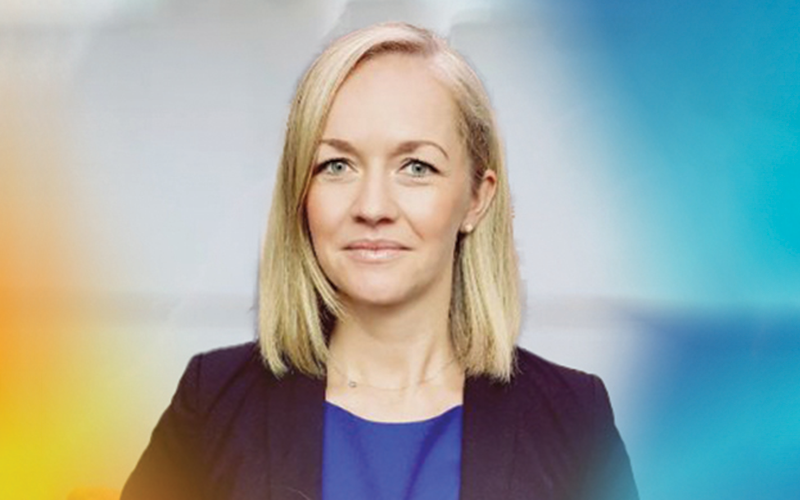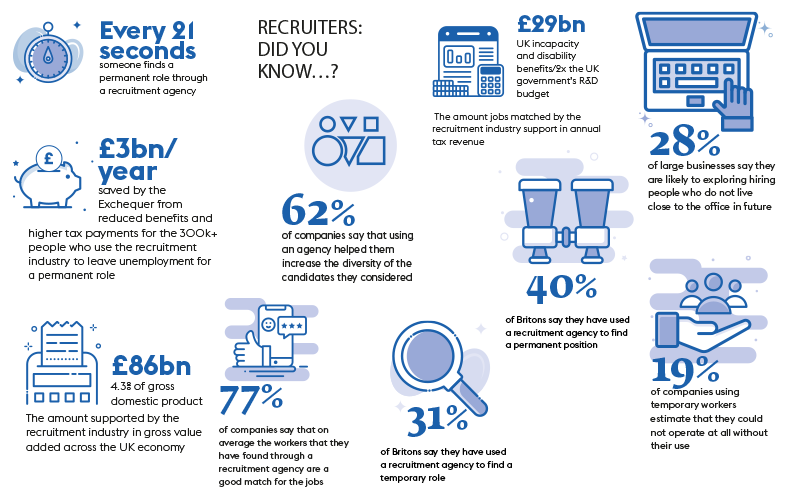2021: a crucial year for recruitment

A new report from the REC showcases the recruitment industry’s value to the UK's recovery
Perhaps the most important takeout for recruitment practitioners is the REC report’s quantification of so many of the differences they make that they may not even be aware of themselves.
Published in February, ‘Recruitment and recovery: How we can create a more productive and inclusive labour market’ spells out the multiple contributions that recruitment agencies and their consultants regularly deliver to UK organisations and jobseekers alike – with or without a pandemic. Underscoring the sector’s importance to the UK is the following statement: “Throughout the pandemic, the recruitment industry has helped keep vital services running. Looking forward, the industry is likely to play a key role in helping displaced workers find new jobs, helping companies adapt to shifts such as the rise of remote working, and helping build a more diverse and inclusive labour market.”
It goes on to say: “2021 will be a crucial year for recruitment. Alongside adapting to the post-Covid economy, the labour market is also set to adapt to the significant changes brought about by Brexit.”
In particular, recruiters are essential to the UK’s recovery from the global Covid-19 pandemic, the REC report says.
Also, recruiters’ successes in matching people with jobs boost UK productivity and increase the diversity of candidates considered for roles, suggests research commissioned for the REC and carried out by research and communications firm Public First.
The report features inputs from recruitment firms such as Acacium Group, Audeliss, nGAGE and Pertemps about challenges they have faced during the pandemic and at other times to bring the contemporary world of work and the right people into UK workplaces.
And in an exclusive case study (see p26), Randstad UK shares with Recruiter how the global recruitment firm is leading the way for living some of the ‘new ways’ of working that their clients and other employers will need to understand and explore in the post-pandemic era.

Covid candidates case study
Randstad recruits, positions new hires remotely
Jenna Alexander (above) is the director of talent acquisition for global recruitment firm Randstad UK and its RPO sibling Randstad Sourceright EMEA. Having been made redundant from her previous role at a start-up in March 2020, she has been a ‘Covid candidate’. Through starting her role at Randstad in July last year, after following interviews with company leaders in April and May, she is a Covid recruitment success story.
And through its response to the pandemic and the acceleration of pre-existing changes to the world of work, Randstad is demonstrating to clients and candidates alike that it can show them how to adapt to new working conditions, break down old barriers and make sure the right talent has the right chances.
Alexander has never visited Randstad UK’s head office in Luton. In fact, if going to the office daily had been a job requirement, she would not have sought the job because of the potential lengthy commute from her home in Berkshire. Similarly, she’s never met in person her team, one of whom lives in Malta and others in Scotland and the US, to name several examples.
So, her new job is clearly aligned with her own recent experiences: in this role, Alexander is embedding remote recruiting, onboarding and working ‘best practices’ in the company’s DNA, as one of Randstad’s ‘new ways’ of working. This includes hiring even newcomers into the virtual world of work – school leavers, interns and graduates, for instance – and planning to hold eight assessment centres virtually over the next two months. “And out of those eight assessment centres, we should be able to facilitate 90 to 100 graduates,” Alexander told Recruiter in a Microsoft Teams call.
“So, we have created a virtual world,” Alexander said. “We’ve added a very unique approach to the candidate journey by engaging them on our platform, with the view that we do everything virtually. They land on our platform, have the opportunity to fill out basic information, and with that, you can actually set up the stages of the interviews whether they are virtual, like this [call], one-way interviews when you pre-record questions, as well as group assessment centres.”
“That what I was brought in to do, and I’m very grateful for it,” she said.
Also, Alexander pointed out, her colleagues who focus on onboarding and learning & development have been laying out the “exact same thing, because you’ve got to be able to set people up for success, when you’re working remotely, and we don’t know if we’re going to go back into offices. And do we really need to? Not necessarily, and if I look at the success of me and a lot of my colleagues… we’ve almost broken down the barriers and, I suppose, the bias toward the fact that people need to be in the office to do well. I think that’s the silver lining of the Covid cloud, in my mind.”
In Randstad’s recent annual report for the last year, the company flagged its #newways initiative, launched in the second quarter of 2020, which has built on its digital transformation. As Randstad explained in its report: “When the pandemic hit, the entire office-based workforce seamlessly went virtual, with employees working from home and interacting with clients and talent through digital platforms.”
The company also set up temporary workers to work remotely for their clients, evidence of the value that recruitment agencies can bring to employers. Other offerings to clients were a free digital toolkit, safety protocols and protocol scans and help to “transition to a digital work environment where this was possible”, the report stated.
“When that big dark cloud of Covid hit last year, within the space of seven days 98% of our staff were working remotely, all set up and good to go because everyone was already set up with our tools,” Alexander said.
When Alexander joined in July, her diary was “fully booked for the first two months”, she said, “because the business has actually made sure that although I’m isolated physically, I’m not isolated emotionally or mentally; I’m always engaging with people”.
In addition, the company proved agile in addressing employment needs of pandemic-struck workforces, switching from deploying them to sectors that were closing down to those facing a boom (online shopping, healthcare and logistics, such as delivery and distribution) as well as providing training and reskilling services.
Randstad also looked to support services that experienced sudden boosts in vacancies requiring filling, such as government operations that needed to beef up workforces to work with unemployment benefit applications and business loans.
In January 2021 alone, Alexander’s domain hired 52 people into the company’s own business. “I think the investment that’s going into what we’re doing sits at about £6m worth [of investment] into new hires coming in this quarter,” she said. “There’s a huge opportunity of untapped talent now because we’ve torn down that barrier of ‘you need to work near Luton’, ‘you need to work at Manchester’ – you can work anywhere you want.”
Naturally, there have been a few bumps along the way, as Alexander acknowledged. “And of course, there have been a few people that have struggled. But part of our strategy is really being able to pick up on the tell-tale signs of someone having a bad time or if someone’s feeling a little bit challenged. We work in a very buoyant industry, there’s a lot of high energy all the time, but we’re only human, and we’re going to have a bad day.
“But we do take very special care with that onboarding because it’s absolutely essential that we set someone up for the best success possible,” she said. “And it takes absolutely every one of us to make sure that those individuals are doing well.”
In the post-lockdown era, Alexander predicted: “I think we’re going to maintain a very flexible and agile approach to our people. I don’t see it changing because the opportunity and the wealth of candidates in the wide talent pool that we’ve now created are exceptional. If you suddenly open up the world, you’ve got diverse talent pools at your fingertips, don’t you?”

Image credit | Shutterstock
